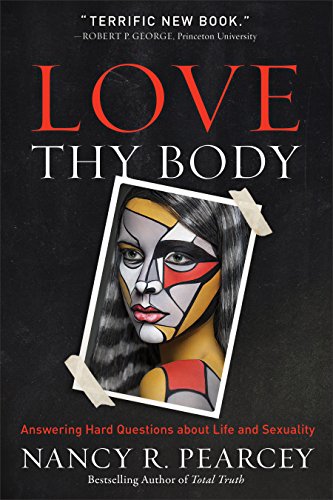Love Thy Body is a rare and important book since it addresses the most controversial and difficult issues about sexuality in modern society from a biblical worldview. Author Nancy Pearcey helps us to understand:
- the roots of modern attitudes toward sexuality
- a biblical perspective based on the 2000-year history of Christian thought and teaching on these subjects
- how to present that biblical perspective in a way that makes sense to unbelievers
One of Pearcey’s important and recurring themes is that Christianity actually has a higher view of the body and greater respect for the individual than that reflected in modern attitudes towards sexuality. She contrasts a Christian view of sexuality and related issues with the increasingly popular personhood theory. While personhood theory is explained differently by its various advocates, Pearcey objects to the commonly-held definitions of the person that say there's no intrinsic value in a person simply by their being alive. Value is instead based upon consciousness, self-awareness, and agency. Thus, the vitality of a person’s mind and their ability to be self-determinant are what defines their value to society. The pre-born baby, the dementia patient, the mentally handicapped, the comatose patient, and others can be easily dismissed and discarded as lacking the essential qualities of personhood.
According to Pearcey, Darwinian theory deserves much of the blame. If God is not the creator, then there is no external morality to which anyone is accountable. In Darwinian thought, the human body itself is merely part of nature and is subject only to the will of autonomous human beings. “It is raw material to be manipulated and controlled to serve the human agenda, like any other natural resource” (p. 24).
The book is brilliant in many ways. For example, one particular point Pearcey made challenged my thinking. It's easy to fall into the trap of thinking of someone in terms of their sexual orientation. But as Pearcey points out, our physical gender is a gift from God, but there are many people who don’t fit into gender stereotypes. Many of them still identify with their biological gender, but the incredible influence of LGBTQ advocates often pressures people into choosing to play a role, identifying themselves in a way contrary to their biological identity. As Pearcey points out, our sexual preferences cannot define us at a fundamental level as do our biological bodies. We make choices about what we do with our bodies, be they right or wrong. However, those choices do not change our fundamental identity. So, for example, a woman who chooses to engage in a lesbian relationship remains a woman and should not be redefined only as a lesbian who has no choice about future sexual relationships. The reality is that she might at some time choose to have a heterosexual relationship—she should not be bound by the homosexual label.
Pearcey points out numerous problems and unintended consequences arising from the push for people to choose gender identities that do not align with their biological identity. For example, feminists who fought for so long for women to have the freedom to have access to roles previously restricted to men are running up against LGBTQ pressure for those women to reject their pride in being women since it highlights gender distinctions. Children raised by same sex couples are sometimes pressured to hide their desire to know their biological father or mother in support of the LGBTQ narrative that the word "parents" isn't solely defined by biology or as a male/female pair. Children sometimes become a commodity used to suit the needs of adults without concern for any psychological damage to the child, exacerbating an issue that is already a problem across the entire culture.
Love Thy Body is much more than an exposé of the moral ills of modern society. As Pearcey says, “We live in a moral wasteland where human beings are desperately seeking answers to hard questions about life and sexuality. But there is hope. In the wasteland we can cultivate a garden. We can discover a reality-based morality that expresses a positive, life-affirming view of the human person—one that is more inspiring, more appealing, and more liberating than the secular worldview" (p.15).
A study guide with questions at the end of the book should be very helpful for those who want to do a group study. Questions for each chapter are followed by true-to-life situational dialogues for participant to respond to for practice.










